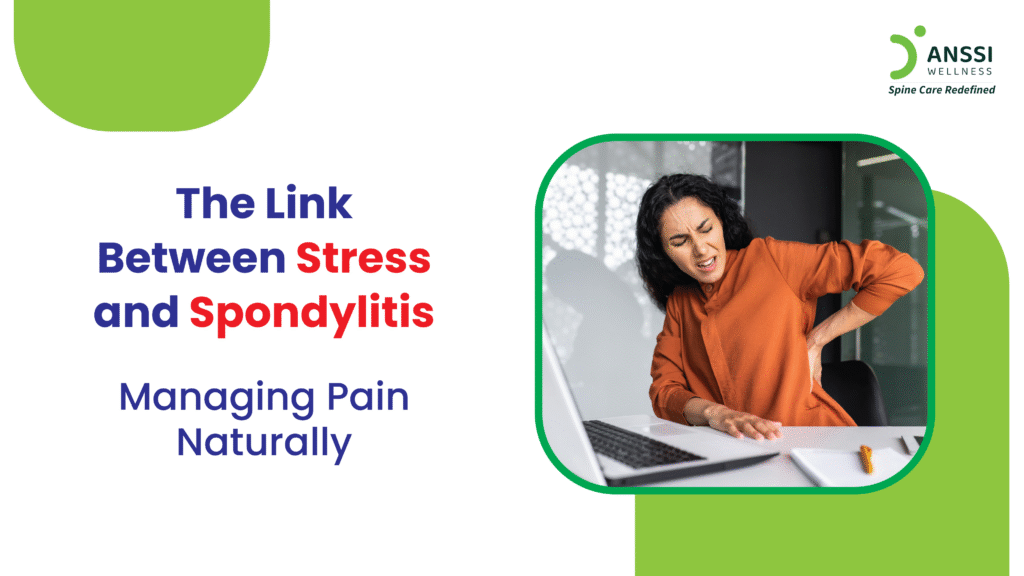Spondylitis is a chronic inflammatory condition that primarily affects the spine, leading to pain, stiffness, and reduced mobility. While most people focus on physical factors like posture or joint degeneration, there’s a hidden yet powerful contributor that often goes unnoticed – stress.
Emotional and mental stress doesn’t just affect your mood; it plays a significant role in how your body experiences pain and inflammation. Managing stress naturally can make a noticeable difference in coping with spondylitis and improving overall well-being.
How Stress Affects the Body and Spine
What we know as stress is your body’s natural reaction to perceived dangers. When you’re stressed, your brain signals the release of cortisol and adrenaline, hormones that prepare you to fight or flee. While helpful in short bursts, chronic stress keeps your body in a state of high alert, leading to inflammation, muscle tension, and weakened immune responses.
For people with spondylitis, this stress response can be especially damaging.
- Elevated cortisol levels increase the body’s inflammatory load, worsening the very inflammation that spondylitis is known for.
- Muscles around the spine can become tight and painful, limiting mobility and adding mechanical stress to the joints.
- Additionally, stress can negatively affect posture, sleep, digestion, and even motivation to stay active, all of which are critical in managing spondylitis.
Stress and Spondylitis Flare-Ups
Many patients with spondylitis report more intense pain during periods of emotional stress. These are often referred to as flare-ups, sudden increases in symptoms such as back stiffness, fatigue, joint pain, and poor sleep.
The connection between mental and physical health is clear: when your mind is under stress, your body feels it too.
Moreover, stress can reduce the effectiveness of treatments. Someone may be following an excellent physiotherapy routine but continue to experience pain due to underlying emotional tension. That’s why a holistic approach that addresses both body and mind is essential for long-term relief from spondylitis.
Natural Ways to Manage Stress and Reduce Spondylitis Symptoms
The good news is that stress can be managed using simple, natural methods that promote relaxation and healing. These lifestyle changes not only calm the mind but also support spinal health, making them perfect for anyone living with spondylitis.
1. Breathing and Mindfulness Techniques
Practising deep breathing, meditation, or mindfulness for just 10-15 minutes daily can significantly lower cortisol levels. It helps shift the body into a parasympathetic (rest-and-digest) state, reducing muscle tension and inflammation.
2. Gentle Exercise and Movement
Staying active is crucial for spinal flexibility. Activities like walking, swimming, or yoga promote circulation, reduce stiffness, and trigger the release of endorphins, which are natural mood boosters and pain relievers. However, consistency is key. So, aim for at least 20-30 minutes most days of the week.
3. Improve Sleep Hygiene
Poor sleep increases sensitivity to pain and weakens the immune system. Establish a calming bedtime routine, avoid screens an hour before sleep, and ensure your mattress and pillow support your spine properly. Quality sleep helps the body repair inflamed tissues and recover more effectively.
4. Eat an Anti-Inflammatory Diet
Certain foods naturally reduce inflammation. Include omega-3-rich foods (like flaxseeds or fatty fish), leafy greens, turmeric, and berries. Cut back on sugar, caffeine, and processed foods which can trigger inflammation. A balanced, whole-food diet fuels both your mind and your muscles.
5. Stay Hydrated
Water supports spinal disc health and keeps muscles functioning properly. Dehydration can increase muscle cramps and fatigue. Drink at least 7-8 glasses of water daily to flush out toxins and maintain joint lubrication.
6. Non-Surgical Treatments
Non-surgical spinal decompression treatment is a safe, drug-free way to relieve pressure on spinal joints affected by spondylitis. When combined with tailored physiotherapy sessions and postural retraining, this can significantly reduce pain and improve daily function. These treatments not only ease physical discomfort but also create a sense of progress and hope, which can reduce stress levels.
About ANSSI:
ANSSI Wellness focuses on improving the quality of life for patients suffering from spinal issues, aiming to provide relief where other conventional treatments have failed. Through advanced non-surgical spinal decompression treatment, ANSSI is committed to helping patients avoid surgery and recover in a safe, effective, and compassionate environment.
Connect with ANSSI Wellness on LinkedIn, Instagram, and Facebook for expert guidance.



